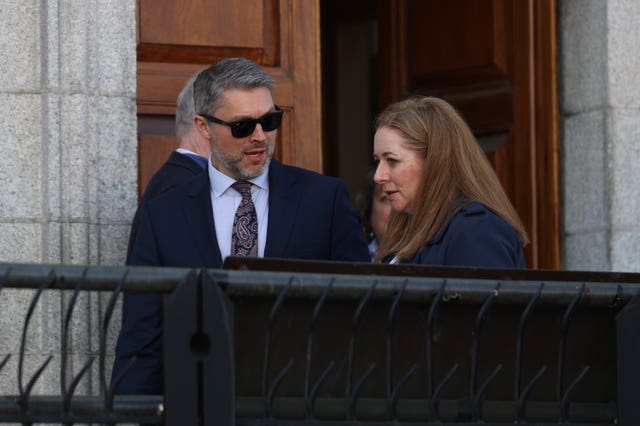Adams tells court he ‘liked but did not have many dealings’ with British spy
Gerry Adams told the court Denis Donaldson was ‘a victim of the conflict’ and his handlers had seen him as ‘expendable’.

Gerry Adams has said he “liked but did not have many dealings” with a British spy who was killed, a Dublin court heard.
The former Sinn Fein president said that Denis Donaldson was “a victim of the conflict” and said the people who he was acting as an informer for had viewed him as “expendable”.
Mr Adams has begun a defamation case after claims were made in a BBC Northern Ireland Spotlight programme in 2016 about who sanctioned the killing of Mr Donaldson, who was a British spy.
Sinn Fein member Mr Donaldson, 55, was shot dead at a cottage near Glenties in Co Donegal in April 2006, months after being exposed as an informer.
Mr Adams has denied the allegation that he had any involvement in ordering the murder.
Opening the case on Tuesday, barrister for Mr Adams, Tom Hogan SC, said the reputation of Mr Adams as a “peacemaker” suffered an “unjustified” attack because of the broadcast of the BBC programme.
At the end of the day Mr Adams entered the witness box and described his early political awakenings in Belfast in the 1960s.
Continuing his evidence on Wednesday, Mr Adams told the court he first met Mr Donaldson in H-11 in Long Kesh prison.
He said Mr Donaldson was not an internee and was a sentenced prisoner who “had been there a long time”.
He told the court he was not sure what Mr Donaldson did after his release, but believed he did some “international work” before becoming an administrator for Sinn Fein’s Stormont team.
Asked whether he was an employee of Sinn Fein, Mr Adams replied “I would say so”.

“I liked the guy and I knew him and I knew his wife and his daughter, Jane, but I didn’t really have many dealings with him,” Mr Adams said.
“I would have been working at another level within the party.”
He said that in 2002, a convoy of RUC Land Rovers arrived at Stormont, raided the Sinn Fein office and arrested Mr Donaldson and others.
The arrests were made in relation to a claim of a republican spy-ring at Stormont, which Mr Adams said was “complete nonsense”.
After IRA decommissioning took place in the summer of 2005, he said Mr Donaldson and others who had been arrested had the charges against them dropped.
“But quite quickly after the charges were dropped it was revealed that he was an agent.”
Mr Adams told the court: “Denis Donaldson got a visit from the PSNI and he was given a piece of paper that alerted him to the fact that he was going to be named as an agent.
“The only people who could have revealed that were the people who were using him, his handlers, so the special branch who he was acting as an agent for.”
Mr Adams said Mr Donaldson told Declan Kearney, of Sinn Fein’s branch in Northern Ireland, who then informed Mr Adams.
Mr Adams asked Mr Kearney to get in touch with Mr Donaldson and “ascertain the truth of this”.
He was interviewed by two senior members of the party, Mr Donaldson acknowledged that he was an informer, and he was dismissed, the court heard.
“Denis acknowledged that he had been an agent and he had been an agent for 20 years,” Mr Adams said.
He said he was not in touch with Mr Donaldson after he left the party, and said he was “shocked” when he received a phone call from the British secretary of state in April 2006 to say that Mr Donaldson had been found dead.
By the time he got in touch with Mr Donaldson’s family, it had been made public that Mr Donaldson had been killed.
“Personally I think that Denis Donaldson was a victim of the conflict,” he told the court. “I don’t see any other way of describing it.”
Mr Donaldson’s family members watched proceedings via videolink.
Mr Adams also described political and civil developments in Northern Ireland during the 1970s and 1980s during proceedings on Wednesday.
“I do think the IRA was a legitimate response to what was happening at the time,” he said.
“That’s not to say that everything they did was legitimate.”
His voice appeared to tremble at one point, as he spoke about the demands of the 1981 hunger strikers to wear their own clothes and receive an education.
“None of them wanted to die,” he said.
He said that afterwards, he began speaking to Fr Alec Reid about “an alternative way forward”.
“If we want the IRA to stop we have to produce an alternative,” he said.
“Let’s get an alternative, and that became my mantra for a number of years,” he said.





